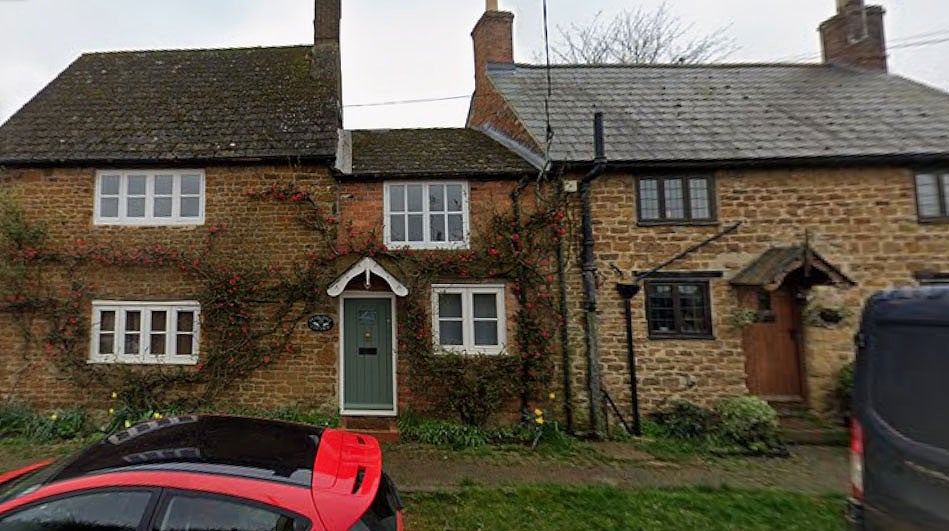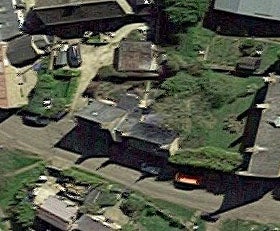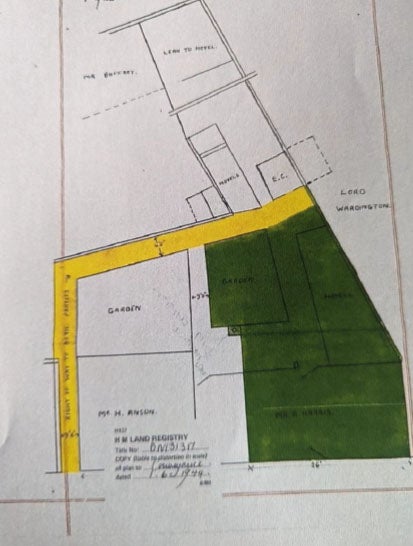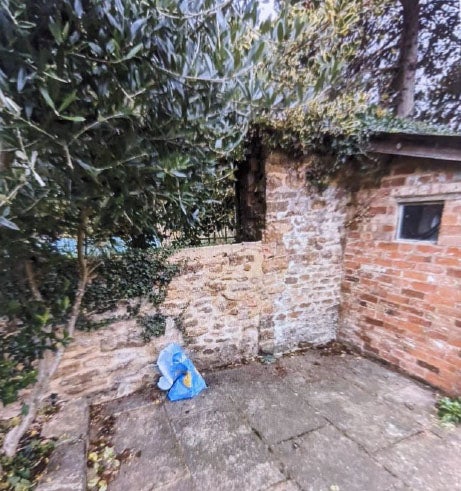ARTICLE AD BOX
An accountant who sued her neighbours, claiming their new fence interfered with her back garden picnics has been ordered to rip out the central heating system and patio from her and her husband's £375,000 cottage after the complaints backfired.
Helen Faber and her partner Dominic Miles saw red in 2021 when returning to their idyllic country cottage in Oxfordshire after a period living in France to find a fence put in by next door neighbours, Richard and Katherine Reid, had "narrowed" a path leading to part of their back garden by 40cm.
They complained the fence was a "nuisance" because any narrowing of the 4-foot wide path would make it difficult for them to carry a "large picnic tray laden with food and drinks...without spilling the drinks" to their patio and second garden area at the end.
After angry scenes, including an incident in November 2021, "during which Mr Miles was very aggressive towards Mrs Reid," they sued their neighbours asking Judge Melissa Clarke at Oxford County Court to rule that the new fence created a "substantial interference" with their use of the shared right of way.
But the move backfired after the judge not only ruled that there was no "nuisance" caused by the fence, but additionally ordered them to rip up their back patio and remove an oil pipe feeding their central heating system - rendering it useless - after finding that both constituted "trespasses" on the Reids' property.
The two couples are now facing off in London's High Court, with lawyers for Ms Faber and Mr Miles appealing and arguing that it was wrong for the judge to order them to remove the pipe - leaving them with no heating and hot water system - and the patio, as well as continuing to insist the fence is moved.
But Mr and Mrs Reid say the county court judge got it right when ordering their neighbours to scrap their patio and heating system and dismissing their gripes about the fence.

High Court judge Mr Justice Richard Smith last week heard that Mr and Mrs Reid's home, Forge Cottage, in Wardington, Oxfordshire, adjoins Ms Faber and Mr Miles' house, Pear Tree Cottage next door, which online sources estimate to be worth £375,000.
The fence which sparked the row lies alongside part of a path which runs up the side of Pear Tree Cottage before turning and running along the back of both neighbours' main back gardens and ending at the second garden belonging to Pear Tree Cottage.
The path itself belongs to the owners of Forge Cottage, but both sets of neighbours have a right of way over it.

Ms Faber and Mr Miles complained that because of the "narrowing" of the shared right of way they were unable to "conveniently" use the path whilst carrying "a large picnic tray laden with food and drinks" to their second garden.
At the end of the Oxford County Court trial, Judge Melissa Clarke, while noting that "Mr Miles was very aggressive towards Mrs Reid" at one point during the row, ruled that the new fence "did not substantially interfere with the right of way".
Going on to order them to take out the oil pipe, disabling their heating system, she said: "An oil line running from an oil tank in the Pear Tree Cottage second garden is on, over and under parts of the right of way.
"The claimants now accept that the right of way is owned by Forge Cottage. The installation by the claimants of an oil line over the right of way is a trespass on the land of Forge Cottage and the defendants are entitled to an injunction requiring the claimants to remove it."
She said the pipeline is "susceptible to damage" and that, if damaged, any oil leaks would contaminate the Reids' land, which is a risk they "should not have to tolerate from trespass."

Last week, arguing that Judge Clarke made the wrong decision, Stephen Taylor, for Ms Faber and Mr Miles, said that the couple had informed their previous neighbours at Forge Cottage before installing the heating system and they had not objected.
He insisted that means their current neighbours cannot now demand its removal.
The court heard that there is no gas supply in the village and that Mr Miles and Ms Faber claim "modern" heating systems like heatpumps are "not suitable for use in a stone-built property more than three centuries old."

Mr Taylor told the judge that previous owners of the Reds' house had done nothing when the oil system was installed and "acquiesced" in Mr Miles and Ms Faber's actions.
"In those circumstances an estoppel arose, estopping the neighbours at the time from later raising an objection," he argued. "That estoppel binds Mr and Mrs Reid in the same way.
"By thanking the claimants for telling them about and not objecting to their plans regarding the installation of an oil pipe, the defendants' predecessor in title created an expectation in the claimants that they could lay their oil pipe under the right of way and not later face any complaint.
"It was their neighbours' tacit representation that laying an oil pipe was 'okay'. The defendants' predecessors created the estoppel which stops the defendants from complaining about the oil pipe now."

In relation to the fence, he added: "The judge wrongly concluded that by creating the two near 90 degree bends in the right of way and by narrowing it by about 33% there was no substantial interference.
"The judge was wrong because ...it cannot be said to be unreasonable for the claimants to insist on being able to use the disputed way when carrying a 1m wide chattel, for example a picnic tray with full glasses thereon.
"The pre-existing fence respected the 4ft width of the disputed way.
"The 2021 fence had reduced the disputed way to 2ft 3in at its narrowest point (and) rendered it difficult to traverse, particularly when transporting logs, garden waste and wheelie bins."

He argued that a 1944 plan showed that the right of way should be 4ft wide all along.
"A 4ft way can be conveniently used, for example to carry a large box along the way or a large picnic tray laden with food and drinks. If the box or tray is 3ft 11in wide it can just get through without spilling the drinks.
"It is submitted that even a small reduction in the width of a 4ft walkway amounts to a substantial interference...It cannot be described as unreasonable for the claimants to insist on being able to use the disputed way conveniently...when carrying a chattel."
He also claimed the judge was wrong in defining the boundary so that part of Ms Faber and Mr Miles' patio was on their neighbours' land and deemed a "trespass" which would have to be removed.

But Anya Newman, for Mr and Mrs Reid, argued that Judge Clarke was right in her ruling at the county court and that the fence should stay and the patio and pipe should be removed.
"The dispute arose after the respondents (Mr and Mrs Reid) replaced an old fence at the rear of their garden," she said.
"It was agreed that the route of the fence was somewhat different to the previous fence, it is now dog-legged instead of running at one angle.
"After initially being happy with the replacement fence, the appellants raised issue about its positioning.
"The respondents denied that the new fence, save for one small section, had changed position from the previous fence. However, they asserted that this change did not substantially interfere with the right of way.
"The judge concluded that...there was no substantial interference with the right of way, which was specified as a right to pass and re-pass on foot because the right of way 'on foot' does not give rise to a right to use bicycles, push-wheeled vehicles, carts or barrows along it.
"In any event, the factual evidence...was accepted that a wheelchair user could substantially and practically use the right of way as conveniently as before.
"There is an oil line running from the appellants’ oil tank in their secondary garden to the appellants’ property. The line runs under and over the right of way, on the respondents’ property.
"The oil line was a trespass...The expert evidence was that the oil line is susceptible to damage and the judge accepted this, ordering the removal of the line.
"It cannot be the case that even if previous neighbours acquiesced to the oil line, they now have a right in perpetuity to site an oil line on their neighbours' land.
"Further, the appellants had also commandeered the end of the right of way, raising and re-paving it for use as a patio to their secondary garden. The respondents also claimed in trespass to remove the patio.
"Due to the decision on the boundary, the patio of the appellants’ which they had used to place patio furniture and a gas canister was a trespass. The raised patio ought to be removed by the appellants."
Mr Justice Smith has now reserved his ruling on the case, to be given at a later date.









 English (US) ·
English (US) ·